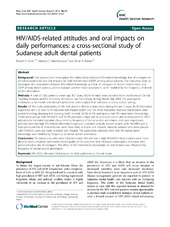| dc.contributor.author | Nasir, Elwalid Fadul | en_US |
| dc.contributor.author | Marthinussen, Mihaela C. | en_US |
| dc.contributor.author | Åstrøm, Anne Nordrehaug | en_US |
| dc.date.accessioned | 2013-11-08T13:59:52Z | |
| dc.date.available | 2013-11-08T13:59:52Z | |
| dc.date.issued | 2013-08-26 | eng |
| dc.Published | BMC Health Services Research 13(1):335 | eng |
| dc.identifier.issn | 1472-6963 | |
| dc.identifier.uri | https://hdl.handle.net/1956/7520 | |
| dc.description.abstract | Background Few studies have investigated the relationships between HIV-related knowledge, fear of contagion in dental environments and Oral Impacts on Daily Performance (OIDP) among dental patients. Our objectives were to investigate the associations between HIV-related knowledge and fear of contagion in dental environments and OIDP among dental patients, and to evaluate whether those associations were modified by the frequency of dental service attendance. Methods A total of 1262 patients (mean age 30.7 years, 56.5% females) were recruited from the Khartoum Dental Teaching Hospital and the University of Science and Technology during March–July 2008. The participants underwent a full-mouth oral clinical examination and completed an interview in a face-to-face setting. Results Of the study participants, 41.4% had visited a dentist at least twice during the last 2 years, 96.2% had caries experience (DT > 0) and 79.1% reported oral impacts (OIDP > 0). The most frequently reported oral impacts were problems eating, sleeping and cleaning teeth. In total, 26.3% of the participants had HIV transmission knowledge, 75.6% knew people with HIV/AIDS and 58.7% perceived a high risk of cross-infection in dental environments. After adjusting for sociodemographic characteristics, frequency of dental service attendance and caries experience, patients who had high HIV-related information exposure, a positive attitude toward people with HIV/AIDS and a high perceived risk of cross-infection were more likely to report oral impacts, whereas patients who knew people with HIV/AIDS were less likely to report oral impacts. The association between OIDP and HIV transmission knowledge was modified by frequency of dental service attendance. Conclusions Dental patients who were informed about HIV and had a high HIV/AIDS risk perception were more likely to report impaired oral health-related quality of life than their less informed counterparts and those who perceived a low risk of contagion. The effect of HIV transmission knowledge on oral impacts was influenced by frequency of dental service attendance. | en_US |
| dc.language.iso | eng | eng |
| dc.publisher | BioMed Central Ltd. | eng |
| dc.rights | Attribution CC BY | eng |
| dc.rights.uri | http://creativecommons.org/licenses/by/2.0 | eng |
| dc.subject | HIV | eng |
| dc.subject | AIDS | eng |
| dc.subject | Attitudes | eng |
| dc.subject | Oral impacts on daily performance | eng |
| dc.subject | Dental | eng |
| dc.subject | Sudan | eng |
| dc.title | HIV/AIDS-related attitudes and oral impacts on daily performances: a cross-sectional study of Sudanese adult dental patients | en_US |
| dc.type | Peer reviewed | |
| dc.type | Journal article | |
| dc.date.updated | 2013-10-03T04:10:44Z | |
| dc.description.version | publishedVersion | en_US |
| dc.rights.holder | Copyright 2013 Nasir et al.; licensee BioMed Central Ltd. This is an Open Access article distributed under the terms of the Creative Commons Attribution License (http://creativecommons.org/licenses/by/2.0), which permits unrestricted use, distribution, and reproduction in any medium, provided the original work is properly cited. | |
| dc.rights.holder | Elwalid F Nasir et al.; licensee BioMed Central Ltd. | |
| dc.identifier.doi | https://doi.org/10.1186/1472-6963-13-335 | |
| dc.identifier.cristin | 1056064 | |

